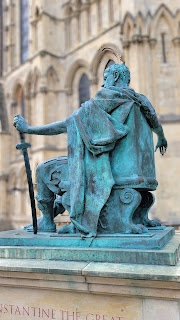Contradictions Invite Curiosity
By Jeffrey M. Bowen
Contradictions can be invaluable
learning tools when we explore rather than exploit them. When a situation
presents features that oppose one another or seem so inconsistent that we are
convinced one must be wrong, then we usually have at least three choices. One
is to ignore the whole thing and remain blissful. Second, convince ourselves that our view is right, regardless of facts,
and manipulate our own truth. Or third, ask questions; seek more information
that might resolve the contradiction. We can deliberately choose ignorance,
remain stubbornly biased, or become curious.
My choice is always curiosity, but
circumstances can dictate otherwise. My approach may be governed by the
availability of time, resources, or my emotional reactions.
Two very different historical events
illustrate my points. Last year we visited the city of York, England where I
was puzzled to see a big bronze statue of the Roman emperor Constantine
relaxing comfortably on a podium near the front door of the largest Gothic
cathedral in northern Europe.
To me this was contradictory. I
thought Romans were pagans and known for murderous pogroms of Christians. After
getting home, I read that Constantine became the first Christian emperor in 306
C.E. Now he is celebrated for having propagated Roman Catholicism throughout
western Europe.
I confess some contradictions
linger. I also learned that this statuesque emperor murdered his wife by
allegedly boiling her in oil. A similar fate befell his sons. Yet Constantine
built major cathedrals in Rome and was notably lenient with priests.
More personally impactful for me is
the contradiction that surrounds the political fate of President Lyndon
Johnson. Historian Doris Kearns Goodwin, in her chronicle of leadership in
turbulent times, tells us that Lyndon Johnson fell victim to a shocking
contradiction in the latter part of his tenure.
In 1964 Johnson enjoyed a landslide
election, a growing civil rights coalition, a booming economy, and a peaceful
world. His so-called “Great Society” initiatives triumphed because of his
amazingly strong ambition and legislative expertise. He seemed to understand
that giving stakeholders a chance to shape measures made all the difference.
The contradiction shows up in the
contrast between Johnson’s monumental domestic successes and his awful
temporizing and misjudgment about the intensifying war in Vietnam. Attempting
to protect funding for his domestic achievements, the president deliberately
downplayed the ballooning budget of the escalating war.
In later years he reflected, “I had no choice
but to keep foreign policy in the wings. I knew that the day it exploded into a
major debate on the war, that day would be the beginning of the end of the
Great Society.” Johnson continued to hide the extent of the Vietnam war until
the American people grew intensely dissatisfied. Then his recourse was to
announce he would not run for reelection.
In 1968 I failed to understand, nor
to this day do I accept, Johnson’s reasoning. His contradiction eventually
resulted in my spending a year overseas involved in a futile initiative to
escape the war by turning it over the South Vietnamese.
As we have learned over the years, interpretations
and documentation of historical events will shift and produce new truths as
well as bitterly contested lies.
History is just one aspect of our
encounters with everyday contradictions. The key is not to ignore or
rationalize them, but to ask questions and investigate as best we can. It takes
a good dose of curiosity and persistence. But it is the only way to learn the
truth.

No comments:
Post a Comment